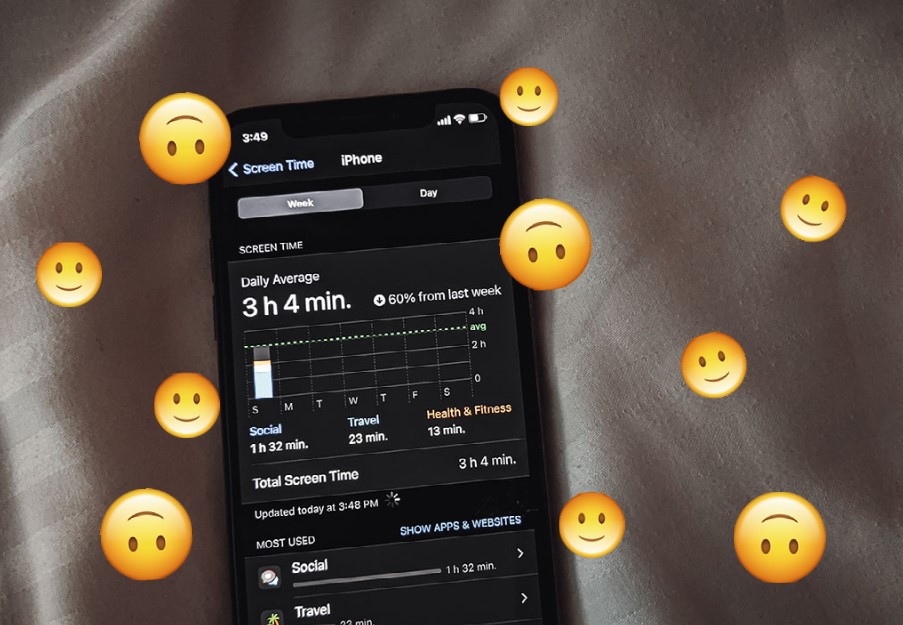DISCLAIMER: Stories and images published in this week’s issue under satire (with the exception of advertisements) are purely satirical and created purely for entertainment and/or parody purposes. They are not intended to communicate any accurate or factual information. Some names used in Excalibur’s satire stories are fictional, and any resemblance to actual persons or entities may be purely coincidental.
In shocking news that contradicts all scientific studies on the matter up to this point, time spent scrolling through social media may actually be strongly tied to eternal happiness, according to a new study.
Canadian research firm Koobecaf Inc. confirmed the findings in a recent report they released publicly. The study initially sought out to find the correlation in all age groups, however, after observing the overwhelming amount of time post-secondary students spent on social media comparing their lives to others, the firm shifted their focus to this demographic entirely.
The study tracked the social media usage of 25 post-secondary students, ranging between the ages of 18 to 23. In an effort to keep the study as reliable as possible, individuals were tracked for an extensive period of time — two days to be exact.
The subjects were instructed to use social media as they normally would, and at the end of each day, they were hooked up to “happiness detectors.” These devices allowed researchers to analyze the concentration of “happy chemicals” in each user’s brain, according to scientists who worked on the study.
“The results were quite fascinating,” says Dr. John Johnson, who led the study and also bears an uncanny semblance to Facebook CEO Mark Zuckerberg.
“We found that there was a strong, positive correlation between the amount of time spent scrolling on Facebook, Instagram, and WhatsApp and how joyous the students felt in their day-to-day lives. Happiness increases almost 70 per cent in those who use these apps. Though they may complain about depression and anxiety, appear tired, and overworked, and even perhaps develop compulsive tendencies due to excessive social media use, the science is quite clear — these apps are making people happier.”
When questioned further on how this makes any sense or how it was even verified, Dr. Johnson gave interviewers a confused look and said, “It’s just science, bro.”
Dr. Johnson counterintuitively states that though they may look miserable, those who spend copious amounts of time on social media are indeed in bliss.
Third-year kinesiology student Jylie Kenner participated in the study and typically makes an effort to only spend 30 to 40 minutes per day on social media.
“I limit my social media usage a lot, and I think it’s definitely contributed to my healthy self-esteem, my confidence, and my overall positive outlook for the future. But after the study, Dr. Johnson told me that I was definitely depressed and that I need to use Instagram more, so now I’m confused,” says Kenner.
Maya Sol, on the other hand, is a fourth-year communications student who averaged four hours a day on social media during the study.
“I’m feeling worse than I’ve ever felt before. I spend my days endlessly scrolling feeds, mentally laughing at memes I’ve seen hundreds of times before and messaging my friends fire emojis. There’s no way this can be good for me, but the researchers insist that I’m happy so I guess I’m doing alright,” says Sol.
Secondary researcher Wayne Bruce explained that when students compare their lives to others on Instagram, hopelessly scroll through old WhatsApp messages from their ex, or post pictures for external validation, the mK gene, responsible for our connection to a spiritually meaningful life, is activated in the body.
“Essentially, social media is the meaning of life. At this point, the link is indisputable. It may be worth our while to forfeit all other life activities completely and focus on browsing Facebook, Instagram, and WhatsApp until the end of time,” says Bruce.
When asked to shed more light on the mK gene, as there were no medical or scientific records available for it anywhere, Bruce walked away angrily, muttering something about how he “doesn’t get paid enough for this shit.”
Dr. Johnson attempted to pick up where Bruce left off, stating that high social media usage during the pandemic is likely triggering the gene in many, resulting in the extremely positive mental health reports we have been seeing among students throughout the lockdowns.
When informed that students’ mental health had actually declined during the pandemic according to literally all statistics, Dr. Johnson once again said, “It’s science, just trust me.”
Dr. Johnson also added that this increase in happiness will not occur with all social media platforms. He reiterated that only Facebook, Instagram, and WhatsApp have been shown to have these effects.
“It’s definitely important to note you won’t see these changes with platforms such as Twitter or Snapchat. We actually recommend people stay away from those, there’s really no telling what could happen to one’s brain with apps like those.”
When asked if this convenient finding had anything to do with the fact that his research firm’s name is Facebook spelt backwards and that he resembles the company’s CEO, Johnson denied the connection before nervously looking around for cameras and asking us repeatedly when this article would be published.


